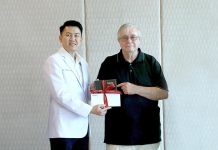When I was still in my first intern year, I scored a posting to Gibraltar, that rocky finger that hangs off Spain in the Mediterranean. The rock was to be my abode for the next six months, while I carried out my surgical term, and it was there that I was exposed to the Spanish adjective ‘simpatico’.
Whilst similar to ‘sympathetic’ in English, it has a much deeper meaning in Spanish and refers not only to how others see you, but also your own personal feelings.
Now while being considered as ‘simpatico’ would look to be an admirable characteristic for a young doctor, it was something of a two-edged sword, as I was to find out later.
The price is a reduction in the doctor’s personal quality time. As you become more and more involved with the patients, whose needs encompass 24 hours, the young doctor ends up as a slave to not just the patients, but to the profession.
However, being an intern is a stressful time for young doctors. Quite frankly, after graduation and a nice new shiny name badge, you do not know enough about common conditions, but are expected to have encyclopedic knowledge by the patients. In my own case, I was quite sure I could diagnose an adenoma of the pancreas, but I had no idea what to do with a child with earache. Like many professions you pick it up as you go – but not too many professions have the ‘life or death’ tag attached.
In case you think that the pressures are not really that bad, after all, the popular image of the young intern is one of permanently trying to get into every nurse’s knickers in between bouts of beer swilling at the closest pub to the hospital, this has to be based on fact, surely. Let me assure you that the “Carry On” movie series was no reflection of the real medical world. Being on call for 108 hours a week does not leave much time for after-hours gynecological studies with Nurse Smith from ICU.
Stress? I can remember one of my consultants telling me that a 24 year old female patient was going to die because her heart muscle had given out. I could not believe that this was the case. Surely we could do something? Unfortunately, all those years ago we could not. Heart transplants were yet to come. Pacemakers likewise. The consultant knew when to ‘turn himself off’. Junior Houseman Corness did not. I kept going back to her bed in the ICU, willing her to live. She was only 24 for Pete’s sake. She died.
The result of such stress on doctors has been studied quite comprehensively, and the respected New England Journal of Medicine published the results of the research carried out by the Johns Hopkins University School of Medicine. The Hopkins team assessed the specialty choices, marriage histories, psychological characteristics, and other career and personal factors of 1,118 physicians who graduated from the Johns Hopkins University School of Medicine from 1948 through 1964.
After decades of following 1,118 physicians who graduated from the Hopkins School of Medicine between 1948 and 1964, researchers found a 51 percent divorce rate for psychiatrists and 33 percent for surgeons, rates higher than those for internists (24 percent), pediatricians and pathologists (each 22 percent). The study revealed a 32 percent overall physician divorce rate.
Results also strongly suggest that the high divorce risk in some specialties may result from the inherent demands of the job as well as the emotional experiences of physicians who enter those fields. Right! You’re telling me nothing I don’t know (from bitter experience, I might add)!
The recommendation was, “Marital counseling during residency training appears to be a good idea for family and career satisfaction in the long term.”
My eldest son, Dr. Jonathan Corness, has the ‘simpatico’ gene and for that reason I tried to talk him out of Medicine as his future. But when he decided that being a Radiologist might be a better specialty than Pediatrics, I applauded his decision. For people like Jonathan, one step back from the frontline is a good career move. Unfortunately, I stayed at the frontline too long.




